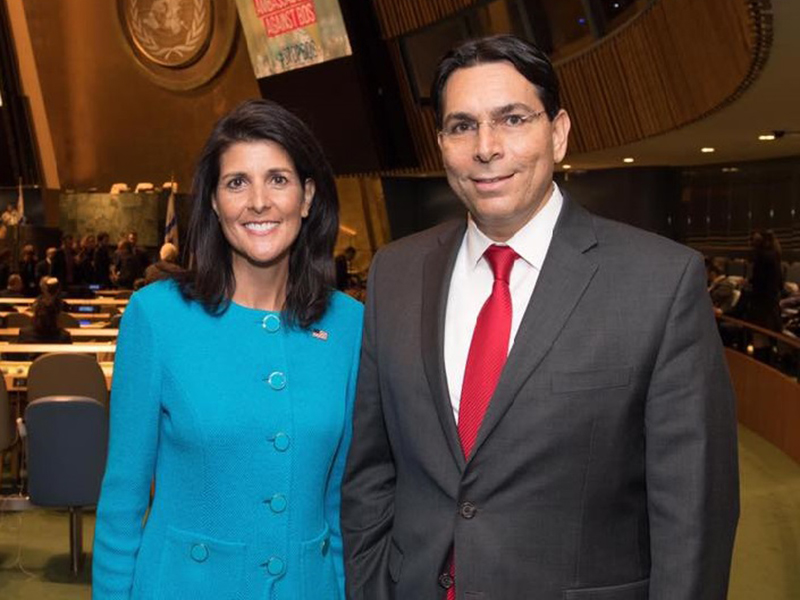Some countries that are publicly critical of Israel at the United Nations are privately expressing appreciation – and even admiration – for the Jewish state behind the scenes, said Danny Danon, Israel’s ambassador to the UN, in an interview with The CJN while he was on a trip to Toronto.
“We see it a lot, mainly with the Arab countries, but even some other countries that join the attacks against Israel, they know exactly that we are not the problem, but we are the solution,” he said.
Danon said that these countries have not always held this private admiration for Israel, but that it is a relatively recent development. From his perspective, there are two main reasons why Israel is beginning to forge better relationships with its Middle Eastern neighbours.
The first is the shared threat of Iran. For example, “I visited Dubai two years ago and I spoke with the leader(s) there, and they are really afraid of the Iranians. And they see Israel as an ally to stop the aggression of Iran,” said Danon.
According to Danon, countries are also improving their relations with Israel behind the scenes because they recognize the value of the technology and innovations it has to offer.
“I think people understand we have a lot to offer them, and we want to offer them. We believe in tikun olam. I think we should take advantage of our capabilities and provide more solutions to developing countries,” he said.

Even though all these countries are warming up to Israel in private, it has yet to translate to significant public support of Israel at the UN. Danon attributes that to the history of voting patterns and to something he calls the “gang mentality.” By that, he means that there are countries that Israel enjoys positive bilateral relationships with in a one-on-one capacity, but when those countries come together as a group, they don’t support Israel.
Another roadblock to public support of Israel in the Arab world has been the lack of a peaceful resolution to the conflict with the Palestinians, but Danon believes that may be changing.
“I think in the past, the equation was: first solve the problem with the Palestinians, then come to us and let’s talk. Today, we hear more that people say, ‘OK, let’s talk and maybe through our relationship we can help you move forward with the Palestinians.’ ”
But what that potential solution might look like is anybody’s guess. A poll conducted last summer found that support for a two-state solution among Israeli Jews and Palestinians has dropped to a historic low – below 50 per cent for both groups.
Danon believes the numbers show that people are pessimistic about all the options and don’t see a way forward in the peace process. In Danon’s view, peace is possible, but it will require different Palestinian leadership, someone like Egyptian President Anwar Sadat. Danon said that Palestinian President Mahmoud Abbas and the Palestinian Authority are undermining the peace process by encouraging terrorism by making payments to terrorists and their families.
Danon also criticized Abbas for preventing aid from reaching Gaza, including blocking a Qatari and Israeli joint effort to provide fuel for Gaza in early October. He said that people who want to fund humanitarian initiatives in Gaza or the West Bank – an idea that Israel supports – should give money to those initiatives directly, instead of providing funding through the PA or the United Nations Relief and Works Agency for Palestine Refugees in the Near East (UNRWA), as some of that money may go to terrorist causes.
We don’t have a lot of friends in the UN, but definitely Canada is one of our friends.
– Danny Danon
Earlier this year, the United States cut its funding to the UNRWA entirely, while other countries increased their contributions, including Canada, which committed an additional $50 million over two years. But in spite of that commitment and a few other moments that concerned the Canadian-Jewish community, such as Canada abstaining from a UN vote condemning Israel for the violence in Gaza and Trudeau failing to mention Hamas in a statement on that same violence, Danon insists that Canada is a trustworthy ally of Israel at the UN.
“We work together. We don’t have a lot of friends in the UN, but definitely Canada is one of our friends,” he said. “We believe that the leadership in Canada knows the difference between right and wrong, and we welcome this partnership.”
Of course, Israel’s strongest ally at the UN is the United States, whose own UN ambassador, Nikki Haley, recently announced her resignation. Danon said that Haley is both a close friend of Israel and a close personal friend, and he is confident that the strong relationship between Israel and the U.S. will continue, even after she’s gone.
As for the U.S. choosing to move its embassy to Jerusalem, Danon said that it shows the world that America stands with its allies and does not succumb to threats.
Danon acknowledges that he has a lot of work to do if he wants the public support for Israel to match the private support, but there are two things he knows that helps him persevere:
“First, I know that I am not by myself and that I represent a strong nation, Jews from all over the world and supporters of Israel from all over the world. And also, I know that at the end, we will prevail.”
